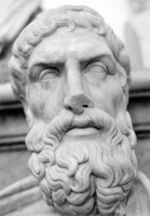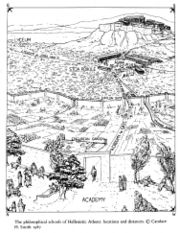Featured Articles
From Epicurus Wiki

Epicurus was born on the Greek island of Samos to Athenian parents. He was one of four brothers. Tradition has it that he became interested in philosophy at age 14. At the age of 20, he was obliged to report to Athens for two years of military service. Afterwards he rejoined his family, who were compelled to abandon Samos and resettle in the Ionian city of Colophon. Epicurus continued to receive education from the likes of Pamphilus, a Platonist, and Nausiphanes, a Democritean. Despite this exposure, Epicurus would later insist that he was entirely self-taught. (more...)
Epicureanism refers to Epicurean Philosophy, the philosophy of Epicurus. Epicurus developed his teachings during the Hellenistic era of Ancient Greece — a period of transition commencing at the time of Athens’ conquest by neighboring Macedonia (4th Century BCE). Juxtaposed within an environment of continuous political turmoil, Epicurus and his colleagues proclaimed that individuals may live in serene happiness, fortified by the continual experience of modest and easily obtainable pleasures. All that is needed to live a fully satisfying life, according to the Epicurean doctrine, are the sustenance of nutritious food, the comfort of a secure living environment, the comradery of good friends, and the assuring wisdom that the nature of the universe is benign.
Epicureanism conveys a surprisingly scientific vision of the natural world, building upon a preivous century's groundwork laid by the presocratics. Epicurus' interest in the workings of nature, however, was not motivated by mere curiosity. He gleaned revelations in physics as a means of ideological fortification against the many disturbing notions of superstition.
Epicureanism would eventually become a philosophy of wide renown, having been spread to the far corners of the ancient Mediterranean world through the founding of organized schools — a tradition which began with Epicurus and continued well into the age of the Roman Empire. (more...)
Epicurus' Garden - At age 35 (306 or 307 BCE) Epicurus purchased a Garden just outside Athens where he set up the final location of his school. The property was purchased for the sum of eighty minae. Epicurus taught philosophy in the Garden continuously until his death. In his will, Epicurus transfered control of the property to Hermarchus, along with a house in Melite, which may have been Epicurus' primary residence and publishing house.
The Garden in Athens was the "main campus" of the Epicurean school where lectures could be heard. Its location near the Academy was perhaps chosen strategically, in order to better compete with it. (more...)

